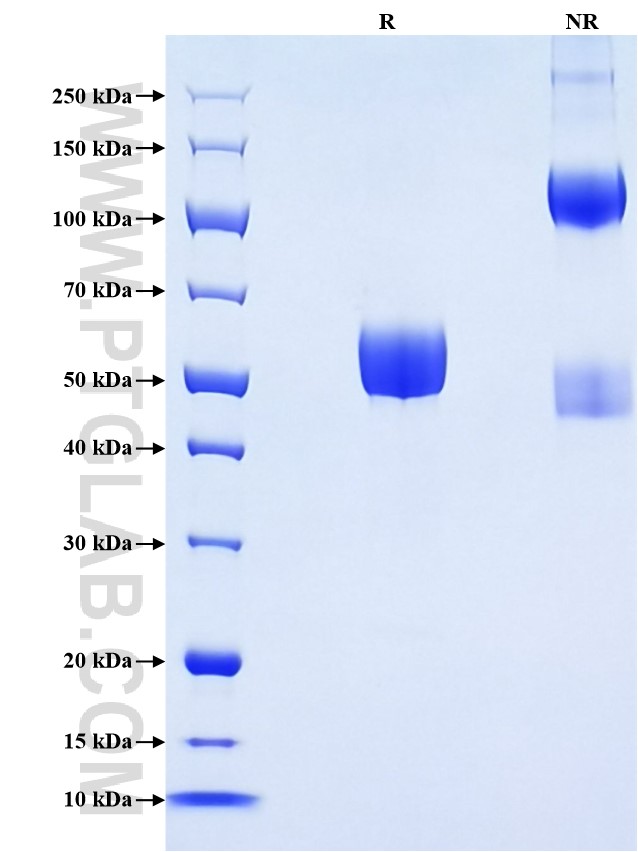Recombinant Mouse CD8A protein (rFc Tag)
种属
Mouse
纯度
>90 %, SDS-PAGE
标签
rFc Tag
生物活性
未测试
验证数据展示
产品信息
| 纯度 | >90 %, SDS-PAGE |
| 内毒素 | <0.1 EU/μg protein, LAL method |
| 生物活性 |
Not tested |
| 来源 | HEK293-derived Mouse CD8A protein Lys28-Tyr196 (Accession# P01731-1) with a rabbit IgG Fc tag at the C-terminus. |
| 基因ID | 12525 |
| 蛋白编号 | P01731-1 |
| 预测分子量 | 45.2 kDa |
| SDS-PAGE | 48-65 kDa, reducing (R) conditions |
| 组分 | Lyophilized from 0.22 μm filtered solution in PBS, pH 7.4. Normally 5% trehalose and 5% mannitol are added as protectants before lyophilization. |
| 复溶 | Briefly centrifuge the tube before opening. Reconstitute at 0.1-0.5 mg/mL in sterile water. |
| 储存条件 |
It is recommended that the protein be aliquoted for optimal storage. Avoid repeated freeze-thaw cycles.
|
| 运输条件 | The product is shipped at ambient temperature. Upon receipt, store it immediately at the recommended temperature. |
背景信息
CD8 is a transmembrane glycoprotein that is predominantly expressed on the surface of cytotoxic T cells, and can also be found on natural killer cells, cortical thymocytes, and dendritic cells. CD8 is composed of two disulfide-linked chains and can be present as a homodimer of CD8α or as a heterodimer of CD8α and CD8β. The majority of class I-restricted T cells express mostly the CD8αβ heterodimer while CD8αα homodimers alone have been found on some gut intraepithelial T cells , on some T cell receptor (TCR) γδ T cells and on NK cells. CD8 acts as a co-receptor that binds to MHC class-I and participates in cytotoxic T cell activation. During T cell development, CD8 is required for positive selection of CD4-/CD8+ T cells.
参考文献:
1. L Shiue, et al. (1988) J Exp Med. 168(6):1993-2005. 2. S Hennecke, et al. (1993) J Biol Chem. 268(35):26607-12. 3. L A Terry, et al. (1990) Tissue Antigens. 35(2):82-91. 4. U Moebius, et al. (1991) Eur J Immunol. 21(8):1793-800. 5. J P Boursier, et al. (1993) J Biol Chem. 268(3):2013-20. 6. A M O'Rourke, et al. (1993) Immunol Today. 14(4):183-8. 7. J C Zúñiga-Pflücker, et al. (1990) J Exp Med. 171(2):427-37.


